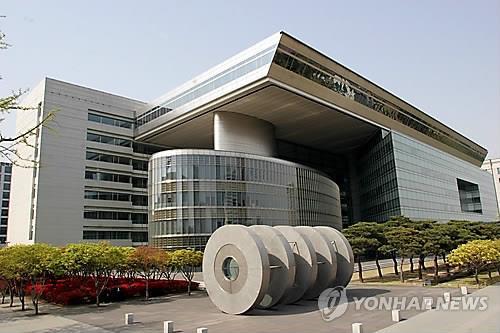Korea Development Bank, a state policy bank under fire for mismanagement of bailed-out companies, said Thursday it would exit from its ownership of 46 companies this year, raising the count by 10 from its earlier plan.
“From 2016 to 2018, we’ll be exiting from our investments in 132 nonfinancial companies,” the Seoul-based bank said in a statement.
 |
Korea Development Bank headquarters (Yonhap) |
After the planned 46 sales this year, the auction process will begin for 44 companies in 2017 and for another 42 in 2018.
The sale plan is part of a road map for reform unveiled by KDB on Thursday in response to mounting criticism from the public and media over its integrity, credibility and capability to lead corporate restructuring.
The Seoul-based lender, which in past crises had acted as the main body for state-led corporate bailouts, is accused of having sat idle on a 1.5 trillion won ($1.3 billion) window dressing of Daewoo Shipbuilding & Marine Engineering. KDB has been the shipbuilder’s largest shareholder and creditor since a bailout in 2000. The DSME’s chief financial officer at the time of the alleged accounting fraud was a former KDB executive.
Despite doubts, KDB’s role and influence will likely grow, as Korea braces for a new round of corporate overhaul.
The Korean government has recently finalized a plan to recapitalize KDB and also state-run Korea Export-Import Bank, with 10 trillion won of central bank money, to give them enough ammunition.
According to the road map, the KDB will form a committee with outside experts that will devise action plans for the reform and oversee their implementation.
“We will also set up a corporate-restructuring advisory panel, consisting of academics and private experts in law, accounting, mergers and acquisitions or the industrial field concerned, to help a successful restructuring of the bailed-out companies,” the bank said.
Also on Thursday, the Eximbank unveiled its own road map to overhaul its organization and management to further boost global competitiveness of Korean exporters.
The policy bank will pursue changes in its organization to be much more efficient yet competitive in the face of macroeconomic difficulties.
This “innovation plan” comes as the country is facing slow growth on low exports with the policy bank running short on capital amid increasing exposure to bad debts by traditional manufacturers.
“The bank will seek to lead by reigniting growth by backing new growth industries in an effort to overcome slow growth amid economic hardships,” the Eximbank said in a press statement.
“To this end, the bank’s innovation plan calls for an intensive overhaul.”
The policy bank’s organization will be evaluated by a consulting firm, and pursue organizational changes based on opinions and suggestions by experts.
It will also seek to improve its process and management to prevent bad debts.
By Lee Sun-young (
milaya@heraldcorp.com) and Park Hyong-ki (hkp@heraldcorp.com)




![[Herald Interview] 'Trump will use tariffs as first line of defense for American manufacturing'](http://res.heraldm.com/phpwas/restmb_idxmake.php?idx=644&simg=/content/image/2024/11/26/20241126050017_0.jpg)

![[Health and care] Getting cancer young: Why cancer isn’t just an older person’s battle](http://res.heraldm.com/phpwas/restmb_idxmake.php?idx=644&simg=/content/image/2024/11/26/20241126050043_0.jpg)

